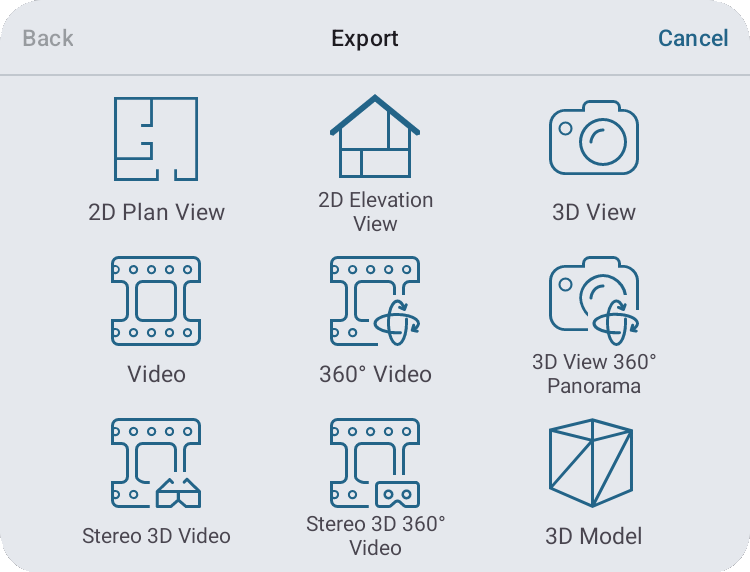Working with Projects
Exporting a 3D Model
You can export a 3D model to one of the following formats:
- Collada (*.dae), Zipped Collada (*.zae, *.zip). This format can be used to transfer your project to other 3D editing software (3DS Max, Maya, Cinema, Strata, Shade and others).
- VRML (*.wrl).
- X3D (*.x3d).
- Wavefront OBJ (*.obj) Wavefront OBJ Zipped (*.zip). (Pro edition only)
- glTF (*.gltf, *.glb). This format can be used to transfer your 3D model to other software in order to use an external renderer. (Pro edition only)
Wavefront OBJ
Wavefront OBJ Zipped
- Choose what you want to export.
To export an object, select it in the project.
To export a floor, activate it in the Building Properties tab of the Inspector.
To export the entire project, you don’t have to select anything in particular. - Tap on the Menu button
 and choose Export and then Share.
and choose Export and then Share. - In the Export popover, select 3D Model.

- Select the Wavefront OBJ (*.obj) option.
- In the Source section, choose an object, or floor, or the entire project.
- Choose whether you want to have the terrain in the exported model.
- Tap on the Share button.
- Select where you want to save the created file, or which app or device you want to share it with.
Collada
- Choose what you want to export.
To export an object, select it in the project.
To export a floor, activate it in the Building Properties tab of the Inspector.
To export the entire project, you don’t have to select anything in particular. - Tap on the Menu button
 and choose Export and then Share.
and choose Export and then Share. - In the Export popover, select 3D Model.

- Select one of the Collada options.
- In the Source section, choose an object, or floor, or the entire project.
- Set up the export options.
- Up Axis defines the name of the vertical axis in the output file. If you don't know the requirements of the software you will use to open the exported model, keep the default state.
- Specify whether you wish to export the light sources, predefined and user cameras.
- Activate Copy Texture Images, in order to export textures along with the model. The textures may be required by a third party software to display your model correctly.
- Choose whether you want to have the terrain in the exported model.
- Tap on the Share button.
- Select where you want to save the created file, or which app or device you want to share it with.
VRML
X3D
- Choose what you want to export.
To export an object, select it in the project.
To export a floor, activate it in the Building Properties tab of the Inspector.
To export the entire project, you don’t have to select anything in particular. - Tap on the Menu button
 and choose Export and then Share.
and choose Export and then Share. - In the Export popover, select 3D Model.

- Select the VRML Version 2.0 (*.wrl) or X3D (*.x3d) option.
- In the Source section, choose an object, or floor, or the entire project.
- Tap on the Share button.
- Select where you want to save the created file, or which app or device you want to share it with.
glTF
- Choose what you want to export.
To export an object, select it in the project.
To export a floor, activate it in the Building Properties tab of the Inspector.
To export the entire project, you don’t have to select anything in particular. - Tap on the Menu button
 and choose Export and then Share.
and choose Export and then Share. - In the Export popover, select 3D Model.

- Select the glTF Text File Format (*.gltf) or glTF Binary File Format (*.glb) option.
- In the Source section, choose an object, or floor, or the entire project.
- Choose whether you want to export light sources, cameras, terrain and environment panorama.
- Tap on the Share button.
- Select where you want to save the created file, or which app or device you want to share it with.